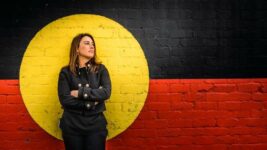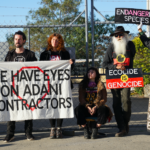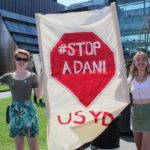Thorpe Calls for a First Nations Legal Defence Fund to Battle Miners

The Coalition’s neoliberal approach to governing involves the passing of flimsy regulations – dressed up as palatable laws – that, in the case of mining and development, charge corporations with progressing the Australian colonising project via the further dispossession of First Nations peoples.
Native title, land rights and heritage laws fail to adequately protect Traditional Owners’ rights. And when matters end up in court, First Peoples who have long had their wealth stolen are forced to face off against expensive legal teams representing cashed-up non-taxpaying corporates.
The last sitting week of federal parliament this year saw a motion to prevent the handing over of $50 million to facilitate the fracking of First Nations land in the NT fail, as well as the passing of laws that undermine land rights in the territory, while WA is contemplating weak cultural heritage legislation.
So, it’s against this backdrop that Senator Lidia Thorpe announced that the Greens are proposing the establishment of a First Nations Legal Defence Fund to facilitate Traditional Owners in challenging projects on their land.
Recognising that “First Nations connection to Country is uniquely important”, the policy works in conjunction with a Greens proposal to establish a billionaires tax that would see the superrich taxed at more equitable rates.
Balancing the scales
“When we take big corporations to court, there’s no money and no support,” Senator Thorpe told Sydney Criminal Lawyers. “Better resources are needed, so Traditional Owners can fight back and assert rights to Country.”
“In balance of power, the Greens will establish a First Nations Legal Defence Fund, so Traditional Owners can access independent legal advice,” explained the Gunnai, Gunditjmara and Djab Wurrung woman.
According to the Greens, the fund is needed because Australian lawmakers have long been eroding the ability of Aboriginal and Torres Strait Islander peoples to mount meaningful legal challenges. And this has been done via the passing of a framework of laws that benefit “dirty mining companies”.
A prime example of this was when former attorney general George Brandis rushed the “Adani Bill” through federal parliament in mid-2017 to ward off the impact of the Federal Court’s McGlade decision made in February that year, which could have jeopardised the Carmichael coalmine.
Indeed, Brandis introduced these laws just thirteen days after the court delivered the McGlade finding.
“Too many sacred sites have already been destroyed,” Thorpe continued. “Labor and the Liberals have decided to destroy Country at Beetaloo, in favour of a company that makes big donations to both parties.”
Taking the funds back
The plan is to establish a $51 million First Nations Legal Defence Fund if the Greens hold balance of power following the next federal election. The money will allow Traditional Owners to seek independent legal assistance in challenging the destruction of Country.
Australian Greens leader Adam Bandt suggested in November that it’s likely neither the Coalition or Labor will hold a majority of seats in parliament following next year’s vote. And with his party eyeing off 10 target seats in the coming election, the aim is to form a power-sharing alliance with Labor.
The fund ties in to Bandt’s broader proposal to establish a billionaires tax. This policy would see ultrarich paying an annual 6 percent tax on their wealth, whilst large corporations earning over $100 million annually would pay an extra 40 percent tax on their excessive profits.
The extra tax revenue would then be funnelled into the First Nations Legal Defence Fund, along with a number of other community-minded schemes.
Destruction and dispossession
The Senate voted down a Greens motion last Monday, which would have prevented $50 million from the public purse being handed over to mining companies to facilitate explorative fracking in the Northern Territory’s Beetaloo Basin.
The proposal to frack the Beetaloo is one of five such projects the PM announced as part of his post-pandemic gas-fired recovery. The project would emit four times more emissions than the Adani mine. And it will devastate the land and the waters of numerous First Nations groups.
“Black lives don’t matter in the Beetaloo. It’s as simple as that: black lives don’t matter in the Beetaloo,” Thorpe told the Senate just prior to the vote. “Both Labor and the Liberals: you need to stop listening to the oil and gas companies that purchase you and your vote.”
And on the day following, Thorpe condemned the passing of a bill amending NT Aboriginal land rights legislation, which were laws cynically framed as economic empowerment measures.
“This bill we’re talking about now gives the mining companies direct access with no free, prior and informed consent,” the senator made clear. “This bill is not about self-determination. It’s certainly not about the empowerment of First Nations people.”
Thorpe pointed to the second schedule of the legislation, which serves to erode processes around applying for mining projects that would save time and money for corporations, it removes stipulations around meetings with Traditional Owners, as well as the need for the minister’s consent.
In the interests of mining
Meanwhile, over in Western Australia, much to the dismay of local First Nations peoples, the Aboriginal Cultural Heritage Bill 2021 has already passed the lower house of state parliament.
This legislation is supposed to prevent mining and development companies destroying Aboriginal sacred sites, as was seen when Rio Tinto blew up the 46,000 year old rock shelters at Juukan Gorge in the Pilbara region in May last year.
A Senate inquiry into the destruction of the site found that “Rio Tinto was not alone in exploiting inadequate state and Commonwealth legislation to pursue resources at the cost of cultural heritage”. And it recommended law reform to provide more adequate protections.
Some of the criticisms of the WA bill before parliament include that the minister would continue to have the final say in a dispute over land, while a newly established council to oversee decisions would only see a majority of First Nations members, with the minister appointing all its participants.
Greens Senator Dorinda Cox has pointed out that the proposed cultural heritage protections are weak and provide no right to appeal for Traditional Owners. The Yamatji Noongar woman added that there is a real need for designated resources for First Nations groups to mount legal challenges.
Battling goliaths
The experience of Wangan and Jagalingou man Adrian Burragubba in fighting against the Adani mine being built on the land of his people is a key example of the disparities faced by First Nations people when attempting to save Country.
The Wangan and Jagalingou struggle against Adani is ongoing. In late 2018, the Indian mining giant requested that an appeal Burragubba was raising be thrown out of court unless Traditional Owners fronted up $160,000 first. The Federal Court whittled this down to a still steep $50,000.
And the transnational corporation subsequently took Burragubba to court in August the following year, in order to recover $600,000 in legal costs from him, effectively bankrupting the First Nations man for trying to save his people’s homeland.
Thorpe further pointed to the report of the Senate inquiry into the Juukan Gorge, which found that mining companies actually “manufacture consent”, which is a point the Wangan and Jagalingou Traditional Owners have also made.
“Mining companies talk to corporations who say they represent the Traditional Owners, when they don’t,” Thorpe concluded. “We need to make sure the right people are making decisions about what happens on their Country.”







